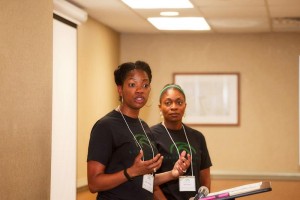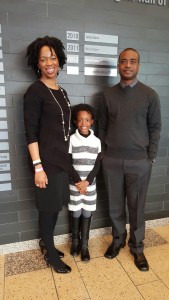
Mentorship and The Church
Mentorship is traditionally thought of as a professional, career-based relationship between a mentor and a mentee. But what about mentorship in the church? Is it really needed? Author Natasha Sistrunk Robinson says, “Yes!” and shares with us why she’s so passionate about mentoring as “intentional discipleship” within the church body.
——
4word: What inspired you to write your upcoming book “Mentor for Life: Finding Purpose through Intentional Discipleship?”
Natasha: Writing “Mentor for Life” was a process. It wasn’t something I set out to do. In the end, it was a result of me being obedient and responding to what God put in front of me. When I was living in Maryland, I was leading a women’s small group ministry with five other leaders. Then God moved my family from Maryland to North Carolina. Our realtor in North Carolina happened to be the women’s ministry director at the church we eventually became members. She asked me to consider starting a mentoring ministry for the women at the church.
I just chuckled, because my heart was already prepared and longing for an opportunity just like this. I felt like God had been doing amazing things in Maryland and that was only the beginning of what He wanted me to continue doing in North Carolina. I prayed about this new opportunity, confirmed a ministry partner, we prayerfully got a team together, and began the ministry (featuring some of the learning and practical experiences I have outlined in the “Mentor for Life” book).
I participated in that ministry for approximately four years and somewhere around the second year, the editor of Christianity Today’s Gifted for Leadership, an online magazine for women called to ministry, asked me to write about the ministry work that I was doing, because she felt like it was needed in the church. The article turned into a five-part series on mentoring!
After writing the articles, I began to receive comments, emails, and social media responses from women saying, “I wish there was something like this at my church,” and single women were saying, “I don’t feel like there’s a place for me in this thing called ‘women’s ministry.’” I also heard from women leaders, asking me if I had “something” that they could do with their women’s groups in their churches, or if I had a curriculum to offer.
The editor said to me, “Natasha, I think you’re onto something here. I think you have enough to write a book.” So this was the natural progression of doing ministry work, which led to sharing about the ministry work, which led to questions about the ministry work, which led to the book project. I never set out to write a book! It was not on my bucket list of things to do. I really view “Mentor for Life” as my offering to the church, because I believe that the church needs it, mainly because people have told me they believe it is a necessary resource for the church, and because the church leaders, pastors, and seminary professors who have already read it have affirmed the same.
4word: Why is mentorship in the church important?
Natasha: In the book, I refer to mentoring as “intentional discipleship.” How we as Christians use the influence God has given us to shape the life of another person is unbelievably important. I believe mentoring in the church should be approached from a communal, relational context. When you think of mentoring, you probably automatically picture a one-on-one scenario. While there is definitely value in one-on-one mentoring relationships, I’ve seen both in my own life and in my studies through the Bible that God may connect you with many mentors who will all play a part in shaping your life.
What we know from the Bible is that it is an Eastern book. This means culturally and contextually, the Bible is often referring to what is happening within community, family, people groups, and what is best for the whole. It’s not an individualistic thing at all. My model for mentoring as intentional discipleship is inspired by Jesus’ relationship with His twelve disciples. When we see Jesus interacting with and teaching His disciples, He’s doing this with them as a group. Even the more intimate relationship He had with The Three (Peter, James, and John) was still with a small group! Not to say that Jesus didn’t have one-on-one relationships with each of His disciples! The Bible just doesn’t seem to highlight that importance. It instead focuses on what Jesus wants the disciples to learn as a group, for the purpose of shaping and changes the nations who cry out to God.
 Think back to the creation story and the birth of Adam. The only thing God says isn’t good (before sin) is the fact that Adam is alone. What I think is critical to see is that God was present with Adam in the garden, and the garden was originally a sinless environment. In that good and perfect (or sinless) environment, God still sees Adam’s aloneness as a bad thing. Adam being paired with someone compatible is something God valued, and he still values today for His children. We need to understand that God was very intentional in saying that it’s not good for Christians to be alone and isolated in this world.
Think back to the creation story and the birth of Adam. The only thing God says isn’t good (before sin) is the fact that Adam is alone. What I think is critical to see is that God was present with Adam in the garden, and the garden was originally a sinless environment. In that good and perfect (or sinless) environment, God still sees Adam’s aloneness as a bad thing. Adam being paired with someone compatible is something God valued, and he still values today for His children. We need to understand that God was very intentional in saying that it’s not good for Christians to be alone and isolated in this world.
There are many issues I believe need to be addressed in the church, but one of the bigger ones is the “80/20 rule,” which is the idea that 20% of people in the church are doing 80% of the work. Pastors and those that have been identified as leaders in the church are often dealing with burnout. This is mainly due to the church not adequately training or equipping other leaders. It is because of this phenomena that I believe mentorship and discipleship in the church is everyone’s responsibility.
The mentoring framework I share in “Mentor for Life” is three-tiered: knowing and loving God, understanding and affirming our identity in Christ, and loving our neighbors. If we are raising up, through mentorship, people in the church with an understanding of their purpose and identity in light of who God is, we will find ourselves with more leaders. When you have more leaders, you have more sharing of the work that needs to be done. According to the apostle Paul in 1 Corinthians 12, when the body of Christ works together, the work of the kingdom of God goes forth. This is why it’s so important for those in the church to understand their purpose in life and their place in the body.
So why wouldn’t you mentor in the church? Seeing the results of not prioritizing discipleship well should alert us to the fact that the church is not fully empowered and not fulfilling the complete work that God has called us to.
4word: Does spiritual mentorship have any effect on a person’s professional life? Can spiritual and professional mentorship work hand-in-hand?
Natasha: Yes, the two absolutely work together. I’ve experienced this in my personal life and I’ve been able to be a mentor spiritually and professionally for others.
In preparation for the book launch, I am having a kickoff event at my church. This event has been designed as an educational opportunity for church members and the public to have a better understanding of mentorship as intentional discipleship. Part of the event will include a panel discussion with mentors of mine, past and present. It was important for me to have these mentors present, because I wanted to show the different sides of mentoring and how everything works together.
 One of the ladies that will be on the panel was my boss when I worked at the Department of Homeland Security. When I decided to leave the military and pursue a career, I had three job offers. All were good, which made my decision a little more difficult. I called an alumnus of the Naval Academy and sought her counsel regarding my decision. She had actually worked for one of the companies that was offering me a job, but advised me to go work at the Department of Homeland Security because of the skill set and influence of the woman that would be my boss.
One of the ladies that will be on the panel was my boss when I worked at the Department of Homeland Security. When I decided to leave the military and pursue a career, I had three job offers. All were good, which made my decision a little more difficult. I called an alumnus of the Naval Academy and sought her counsel regarding my decision. She had actually worked for one of the companies that was offering me a job, but advised me to go work at the Department of Homeland Security because of the skill set and influence of the woman that would be my boss.
During my interview for the job, my future boss seemed to sense (more than I had) how unsure I was about the job. I’m typically a confident person, but after having been in the military for eleven years, that was all I knew. The thought of starting something new was unsettling for me. My boss seemed to understand this fear, and she told me, “I can sense that you aren’t sure about this. But let me tell you this. Come here and do a good job. Network and meet great people, and use this job as your ‘transition’ job to figure out what you want to do.”
Having that freedom and support gave me a great sense of safety about this job and new career. It was about this time that I began writing for Christianity Today. I sent my boss the first article I had published, and she ended up calling me into her office and talking with me for a good half hour about it! It was so encouraging to hear from her, this accomplished woman, how much she’d gotten out of what I’d written. She encouraged me to keep writing, and later, she encouraged me to pursue going to seminary.
I’m so blessed to have this woman as a mentor and friend. She is an amazing example of how to be a Godly influence in a secular environment. Whether they knew it or not, everyone who came in contact with her saw Jesus. What better example of marrying spiritual and professional mentorship could there be?
——
Have you experienced spiritual mentorship? Is it something your church could use? Be sure to order your copy today of “Mentor for Life: Finding Purpose through Intentional Discipleship” and start your journey toward intentional discipleship!
——
——
Do you feel called to be a mentor? Are you looking for a mentor? The 4word Mentor Program is currently accepting applications for the upcoming fall session. Visit the Mentor Program website today and submit your online application by September 2, 2016!
——
Please click here to receive these impactful blogs automatically to your inbox.
——
Natasha is the author of Mentor for Life: Finding Purpose through Intentional Discipleship and the visionary founder of the nonprofit, Leadership LINKS, Inc. She is a graduate of Gordon-Conwell Theological Seminary Charlotte (cum laude, M.A. Christian Leadership) and the U.S. Naval Academy. A former Marine Corps officer, Natasha serves as a Bible teacher, writer, anti-human trafficking advocate, and champion for education. She has over 15 years of leadership and mentoring experience in the military, government, church, seminary, and nonprofit sectors. She is a sought after leadership consultant, mentoring coach, and speaker. Connect via her official website, blog, Twitter, or Facebook.


